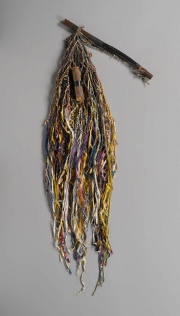Difference between revisions of "Duct tape"
Jump to navigation
Jump to search
| (One intermediate revision by one other user not shown) | |||
| Line 1: | Line 1: | ||
| − | [[File:2004.2109-SC185597.jpg|thumb| | + | [[File:2004.2109-SC185597.jpg|thumb|Rag tassel<br>MFA# 2004.2109]] |
== Description == | == Description == | ||
| Line 10: | Line 10: | ||
Duck tape® [Duck Products] | Duck tape® [Duck Products] | ||
| − | == | + | ==Resources and Citations== |
| − | Duck Products: [http://www.duckproducts.com/ website] | + | * Duck Products: [http://www.duckproducts.com/ website] |
| − | + | * Lee Valley Technical Bulletin, Issue 23, May 2005. | |
| − | * | + | * Internal analysis report MFA, March 2005. |
| − | + | * Art and Architecture Thesaurus Online, https://www.getty.edu/research/tools/vocabulary/aat/, J. Paul Getty Trust, Los Angeles, 2000 | |
| − | |||
| − | * Art and Architecture Thesaurus Online, | ||
[[Category:Materials database]] | [[Category:Materials database]] | ||
Latest revision as of 12:14, 27 July 2022
Description
A heavy, plastic-coated, waterproof, cloth tape with pressure sensitive adhesive that was developed during in 1942 by Permacel. The 3-ply product was initially composed of a plastic Cellulose nitrate laminated Cotton strips coated with a rubber-based adhesive. Within a short time, the plastic coating was switched to Polyethylene to increase water resistance. It was given the name 'duct tape' in the 1950's when the tape was advertised for minimizing air and water leaks in duct work. Duct tape typically has a silvery-color metallic paint on the exterior surface and is sold in rolls. The most common current adhesive is a synthetic rubber based material, such as Polyisoprene.
Synonyms and Related Terms
Duck tape® [Duck Products]
Resources and Citations
- Duck Products: website
- Lee Valley Technical Bulletin, Issue 23, May 2005.
- Internal analysis report MFA, March 2005.
- Art and Architecture Thesaurus Online, https://www.getty.edu/research/tools/vocabulary/aat/, J. Paul Getty Trust, Los Angeles, 2000

